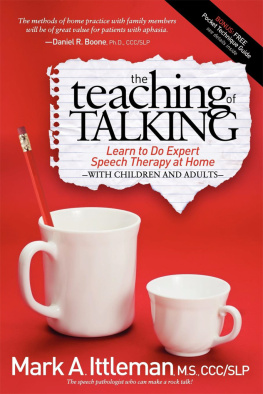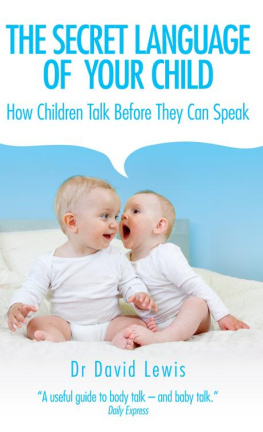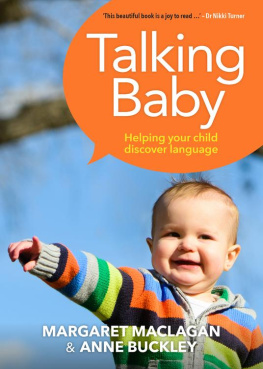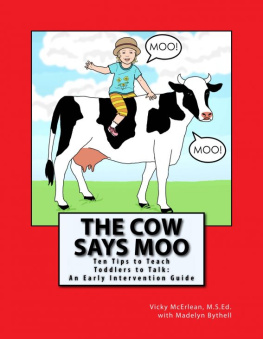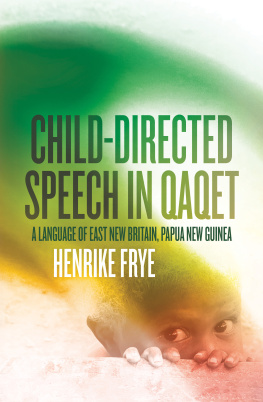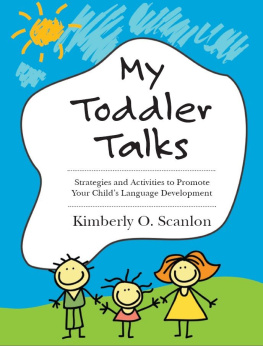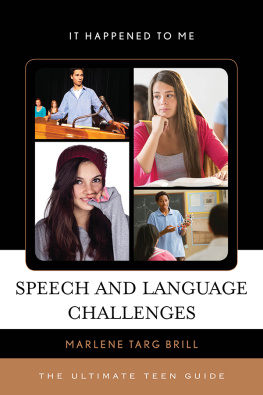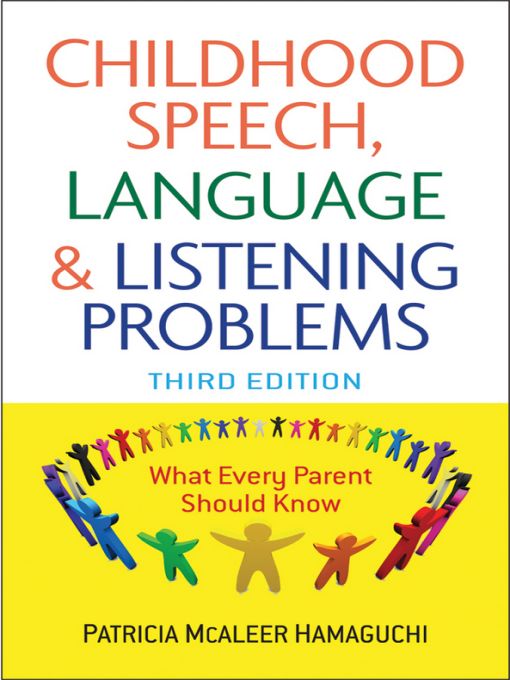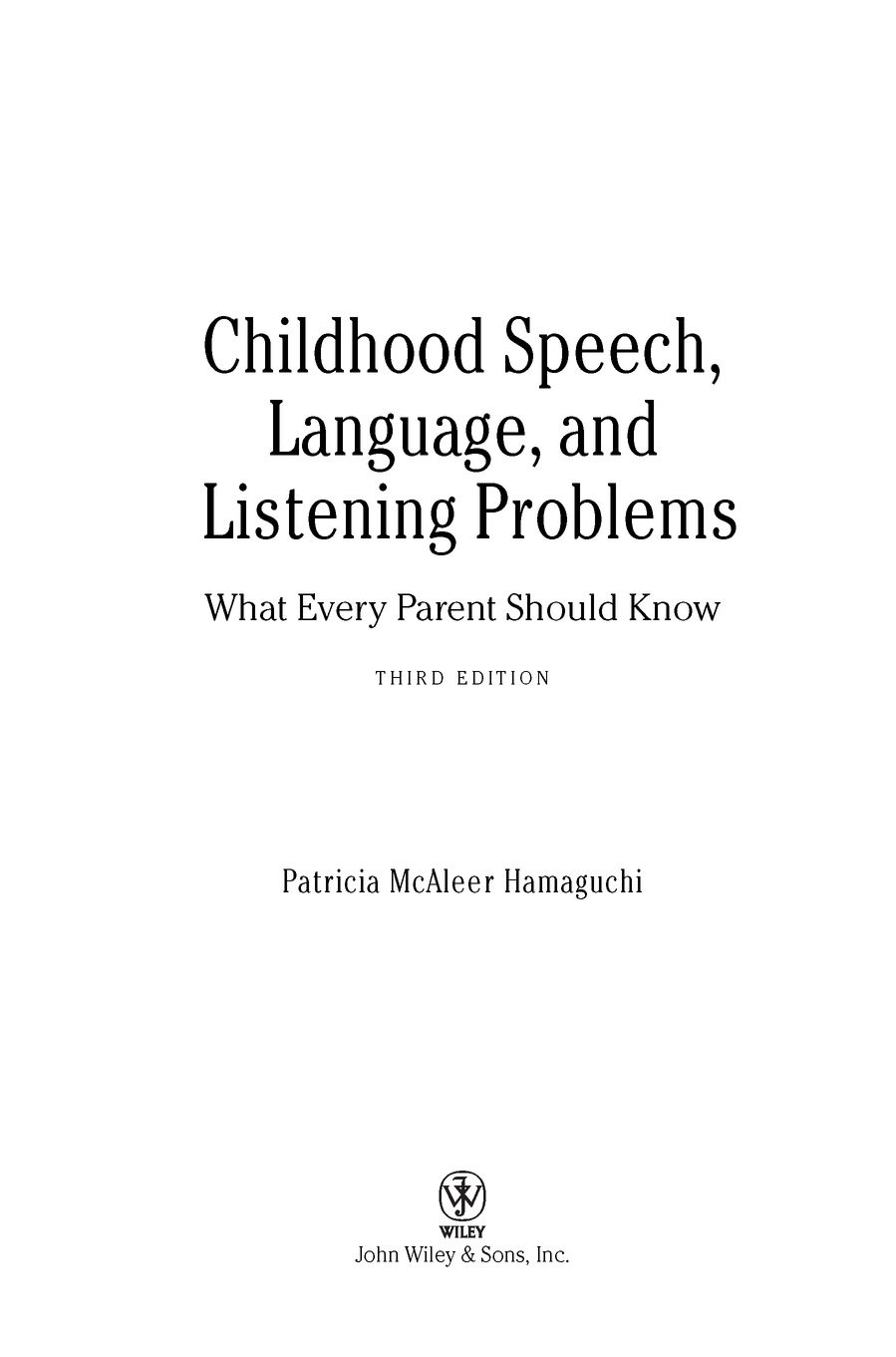Table of Contents
To my husband, Norihito, for his unwavering support
and patience throughout this project.
And to my father, Frank McAleer, who taught me
the power of words, and my mother, Joan McAleer,
who taught me the value of listening.
Acknowledgments
With this third edition, there have been many balls to juggle and keep in the air while writing. Without lots of support, it could never all have gotten done, so there are many people to thank! First, my husband, Norihito; children, Justin and Sara; and friends who have been there to give me moral support and pick up my kids when needed, Christina Gluhaich and Nasreen Ahmed.
I could not have managed to take the time off over the summer to get this together had it not been for the master multitasker who runs my front office at the practice, Michelle Talerico-Hurst. Michelle, a huge thank-you to you! You are the best! The rest of the Hamaguchi Office Friendskeep me energized with their passion and love for the children we work with, with our collective experiences serving as a backdrop for many of the issues discussed in this edition: Gail Ballenger, Michelle Turkoglu, Jennifer Minton, and Kristen Moore. Another thank-you to Amie Reese, who is going to be the most amazing speech-language pathologist when she graduates.
A big thank-you to June McCullough, who is not only a fantastic audiologist and a professor at San Jose State University, but also a very dear friend who has been a great resource for all things related to audiology. Deb Ross-Swain has been another great resource and friend who has been very generous sharing her thoughts on auditory processing and autism spectrum disorders over the years, as well as collaborated on a number of writing and speaking projects. I have a very special group of online friends who have given me great professional support over the past few years and help keep me current with all the latest cutting-edge thinking in the field of speech pathology, but more than that, they are a great sounding board for everything related to private practice: the American Academy of Private Practice Speech-Language Pathologists & Audiologists (AAPPSPA). Thanks to Barbara Moore for letting me pick her brain on school issues; to Yvette Tazeau and Sharadha Raghavan, who have given me invaluable insight into neurobiological disorders; to Henriette Langdon on issues related to bilingual language learning; and to my COA Friends, who keep me on my toes with all things related to sensory-integration and OT issues: Teri Wiss, Barbara Fourt, Pam Joy, Patti Volpe, and Glenda Fuge. You guys are the best!
Lastly, thanks to John Wiley & Sons and my editor, Christel Winkler, and production editor, Rachel Meyers, as well as to my agent, Alison Picard, for helping to put this current edition together.
Introduction
Sometimes when I try to think of what I want to say, uh... the words get um ... jumbled up in my head.... When the teacher calls on me in class, I cant think of it fast enough, so uh... I just say I dont know. I wish I wasnt so stupid.
Jared, age 9
Sometimes I dont understand what Miss Rodriguez is talking about. Ive heard the words before, but I forget what they mean. When I have to write my spellingwords in sentences, I hate it! I kinda know what they mean, but not exactly.When I read stories, I dont understand whats going on. And when I take testsin class, I forget everything. All the names and places start to sound the same. Maybe my teacher is right: if I really tried, I could do better.
Janet, age 10
Little Red Riding Hood is about a wolf and-and-and he putted on Grandmas clothes and shes pickin flowers and she doesnt know its him so hesuh, shesin the closet, and boy is she scared! She thinks its her, but she gots tricked, so the wolf chases her.... Is that your game on the shelf?
Michelle, age 7
Yesterday Mrs. Sauer was telling us what to do, and I couldnt remember what she said, so I asked Jamaal cause hes smart. When she caught me askin him, she got really mad because she said I should pay attention better, but the words just fly out of my head like a bird.
Tamina, age 5
Jessica is a very bright child, so I know there cant be anything wrong with her.Besides, weve given her so much stimulation from the time she was in the womb!Still, my sister keeps telling me that maybe she should be saying more than afew words at two and a half years old. My pediatrician doesnt seem concerned,so I guess Ill just wait a few years and see if she outgrows it.
Mother of Jessica, age 2
I know Tatiana is a bright girl. She gets straight As in math and is a whiz inart, music, and PE! I think thats because she likes those classes better. Shejust sits and stares at the paper for half the period during language arts. If Iprod her, shell put a few words down every once in a while, but its like pullingteeth. If she had a learning disability, she wouldnt be such a good reader, right?So she must just be lazy, I guess.
F. G., teacher
Most of the time I can figure out what Ben wants from us. Weve developed a code,if you will. For example, I know when he says,Goggahe wants me to take him somewhere in the car. I feel bad when other people dont understand him, but weve learned to be good translators. Its not a problem for us, so why bother subjecting him to speech therapy? I wouldnt want him to feel like hes different from the other kids. Besides, I heard that most kids outgrow this stuff. If he doesnt, they can work with him when he gets to kindergarten.
Father of Ben, age 4
Caleb is talking okay, after a little bit of a slow start. Hes amazingly bright!At age three, he is already starting to learn to read. Hes incredible on the computer and a whiz with puzzles. I just wish he had a little more interest in theother children. His eye contact is poorI have to keep reminding him to lookat me. His preschool teacher tells me he just wanders around or goes in a cor-ner by himself. He doesnt seem interested in the other children. Sometimeshe even talks to himself. His teachers are concerned, and so am I. Is he justshy or is it something more?
Mother of Caleb, age 3 shy or is it something more?Mother of Caleb, age 3
These are the voices of children with communication disordersand the adults in their lives. If their words sound familiar, then you have found the right book. I wrote it for parents like you. Perhaps you suspect your son or daughter has a speech, language, or listening problem, but arent sure. Or maybe you are sure but would like to have more understanding and information. Armed with knowledge, you are in a better position to help make your childs life more fulfilling and far less challenging. Despite all the other caregivers, teachers, and specialists who touch a childs life, parents need to be the most educated about their children and what they need. You are your childs best advocate!
If you suspect or have been told that your child has a speech, language, or listening problem, you are far from alone. The most recent estimates indicate that more than 1 million children (1,137,934) between the ages of 6 and 21 receive speech and language special education services in U.S. public schools. Another 641,713 children from birth through age 5 receive speech therapy services (according to the U.S. Department of Educations latest figures from 2007). In addition to these children, there are undoubtedly more who could benefit from receiving therapy services or who choose to utilize private therapy in lieu of the available public services.



